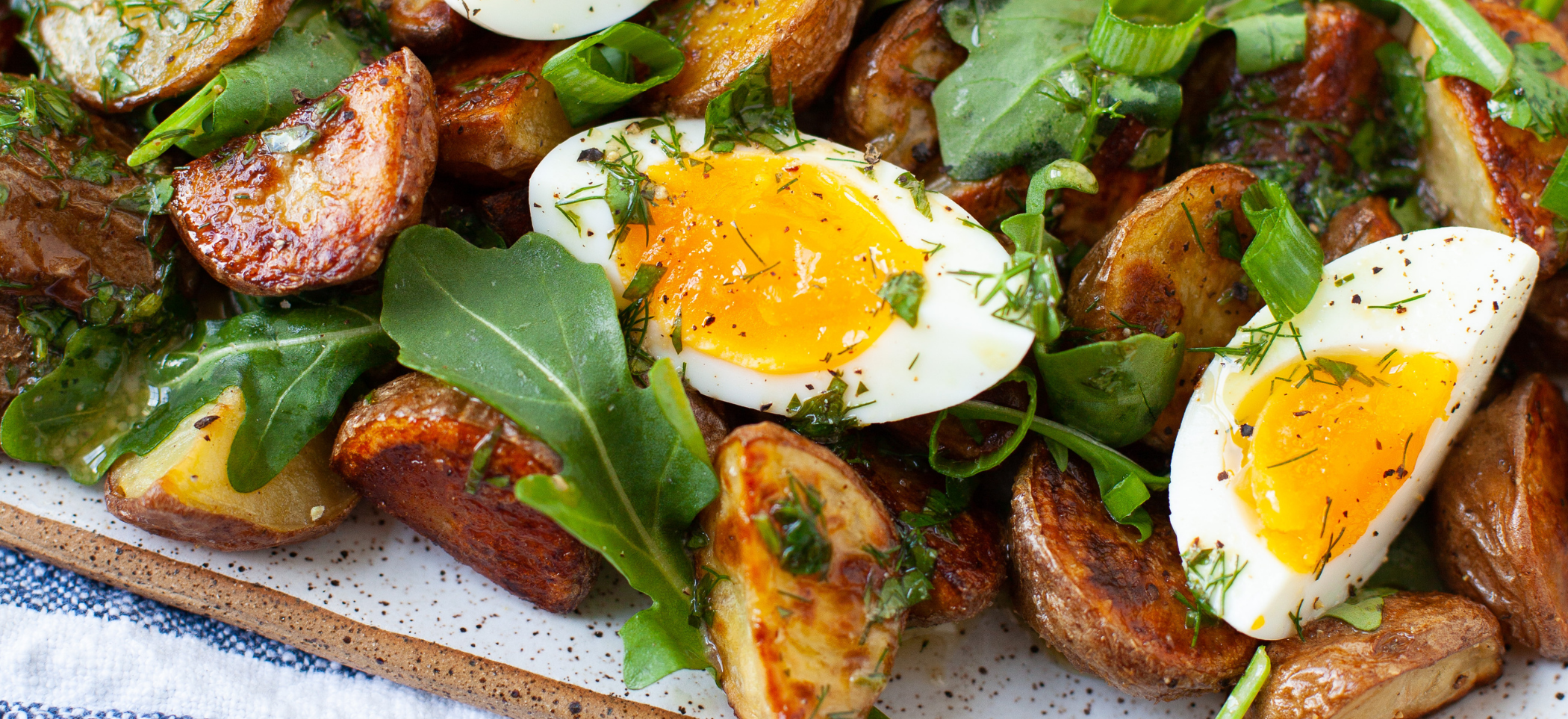

-
40M Total Time
-
5M Prep Time
-
14 Ingredients
-
6 Servings
Need a potato salad recipe that’s perfect for summer cookouts? You have to try this Roasted Potato Salad with a fresh Herb Vinaigrette. It’s topped with perfectly jammy eggs for an extra layer of nutrition and flavor.
This recipe was developed for the Egg Nutrition Center by Kara Lydon, RDN.
Kara Lydon, RDN
- Potato Salad
Directions
Preheat the oven to 400 degrees F. Line two baking sheets with parchment paper.
In a medium bowl, add potatoes, olive oil, salt and pepper and toss to coat.
Pour potatoes onto baking sheets and spread potatoes out evenly so there is space in-between.
Roast potatoes until browned and crispy, about 30-40 minutes, flipping them over twice during baking.
While the potatoes are roasting, fill a medium pot with water, and bring to a boil.
Turn heat down to low or medium-low and gently add eggs to the pot. Let eggs cook at a low boil for 6 ½ minutes. Remove eggs from the pot and place them into an ice bath.
Once eggs are cool, remove them from ice bath, peel them, and slice into quarters.
In a large bowl, add roasted potatoes, arugula, and eggs. Add vinaigrette and toss to evenly coat. Garnish with sliced scallions if desired.
Salad is best served warm or at room temperature.
Ingredients
- 1.5 lb new potatoes, halved or quartered (about 1-inch pieces)
- 2 Tbsp. olive oil
- 1/2 tsp. salt
- 1/4 tsp. ground black pepper
- 6 large eggs
- 1 cup arugula
- for garnish sliced scallions (optional)
- Herb Vinaigrette
Directions
In a small bowl, whisk together vinegar, mustard, dill, parsley, salt, and pepper. While whisking, slowly add olive oil.
Toss with potato salad.
Ingredients
- 1 Tbsp. red wine vinegar
- 1 tsp. Dijon mustard
- 1 Tbsp. chopped fresh dill
- 1 Tbsp. chopped fresh parsley
- 3 Tbsp. olive oil
- 1/4 tsp. salt
- 1/4 tsp. ground black pepper
Per serving:
- Calories 260
- Total Fat 16 g
- Saturated Fat 3 g
- Cholesterol 185 mg
- Polyunsaturated Fat 2 g
- Monounsaturated Fat 10 g
- Sodium 290 mg
- Carbohydrates 20 g
- Sugar 1 g
- Dietary Fiber 2 g
- Protein 9 g
- Vitamin A 90 mcg
- Calcium 50 mg
- Iron 2 mg
- Vitamin D 1 mcg
- Folate 40 µg
- Choline 160 mg
- Potassium 570 mg
To ensure food safety, eggs should be cooked until both the yolk and the white are firm. Consuming raw or undercooked eggs may increase your risk of foodborne illness, especially for those with certain medical conditions. For recipes that call for eggs that are raw or undercooked when the dish is served, use either pasteurized shell eggs that have been treated to destroy Salmonella, or use pasteurized egg products.





 Grains
Grains Vegetables
Vegetables Fruit
Fruit Dairy
Dairy Protein
Protein